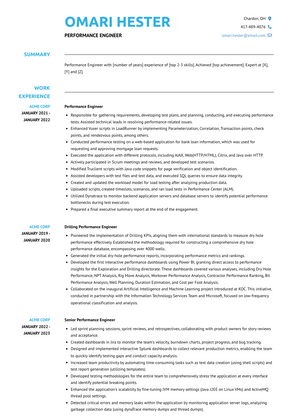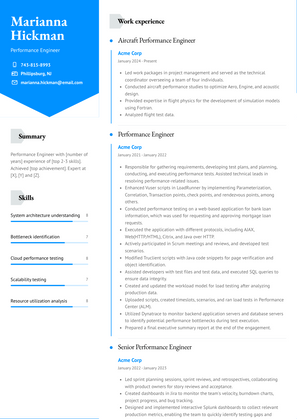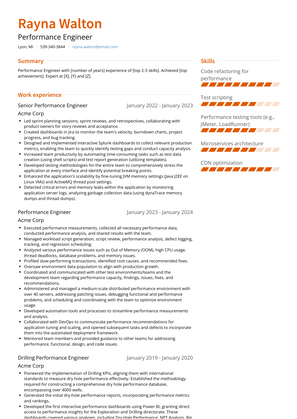Performance Engineer Resume Examples and Templates
This page provides you with Performance Engineer resume samples to use to create your own resume with our easy-to-use resume builder. Below you'll find our how-to section that will guide you through each section of a Performance Engineer resume.



What do Hiring Managers look for in a Performance Engineer Resume
- Technical Expertise: In-depth knowledge of performance testing tools and methodologies.
- Problem-Solving Skills: Proficiency in identifying and resolving performance bottlenecks and issues in software and systems.
- Analytical Abilities: Ability to analyze performance metrics and data to make data-driven decisions.
- Scripting and Automation: Skill in scripting languages (e.g., Python, JMeter) for automating performance tests.
- Communication Skills: Effective communication to report and present performance test results and collaborate with development teams.
How to Write a Performance Engineer Resume?
To write a professional Performance Engineer resume, follow these steps:
- Select the right Performance Engineer resume template.
- Write a professional summary at the top explaining your Performance Engineer’s experience and achievements.
- Follow the STAR method while writing your Performance Engineer resume’s work experience. Show what you were responsible for and what you achieved as a Performance Engineer.
- List your top Performance Engineer skills in a separate skills section.
How to Write Your Performance Engineer Resume Header?
Write the perfect Performance Engineer resume header by:
- Adding your full name at the top of the header.
- Add a photo to your resume if you are applying for jobs outside of the US. For applying to jobs within the US, avoid adding photo to your resume header.
- Add your current Performance Engineering position to the header to show relevance.
- Add your current city, your phone number and a professional email address.
- Finally, add a link to your portfolio to the Performance Engineer resume header. If there’s no portfolio link to add, consider adding a link to your LinkedIn profile instead.
Bad Performance Engineer Resume Example - Header Section
Cason 308 E. Homewood Lane Westford, MA 01886 Marital Status: Married, email: cooldude2022@gmail.com
Good Performance Engineer Resume Example - Header Section
Cason Reilly, Westford, MA, Phone number: +1-555-555-5555, Link: linkedin/in/johndoe
Make sure to add a professional looking email address while writing your resume header. Let’s assume your name is John Doe - here is a formula you can use to create email addresses:
- firstnamelastname@email.com - johndoe@email.com
- firstname.lastname@email.com - john.doe@email.com
- lastname.firstname@email.com - doe.john@email.com
- f.lastname@email.com - j.doe@email.com
- l.firstname@email.com - d.john@email.com
- firstnamelastname12@email.com - johndoe12@email.com
For a Performance Engineer email, we recommend you either go with a custom domain name (john@johndoe.com) or select a very reputed email provider (Gmail or Outlook).
How to Write a Professional Performance Engineer Resume Summary?
Use this template to write the best Performance Engineer resume summary: Performance Engineer with [number of years] experience of [top 2-3 skills]. Achieved [top achievement]. Expert at [X], [Y] and [Z].
How to Write a Performance Engineer Resume Experience Section?
Here’s how you can write a job winning Performance Engineer resume experience section:
- Write your Performance Engineer work experience in a reverse chronological order.
- Use bullets instead of paragraphs to explain your Performance Engineer work experience.
- While describing your work experience focus on highlighting what you did and the impact you made (you can use numbers to describe your success as a Performance Engineer).
- Use action verbs in your bullet points.
Aircraft Performance Engineer Resume Example
Aircraft Performance Engineer
- Led work packages in project management and served as the technical coordinator overseeing a team of four individuals.
- Conducted aircraft performance studies to optimize Aero, Engine, and acoustic design.
- Provided expertise in flight physics for the development of simulation models using Fortran.
- Analyzed flight test data.
Performance Engineer Resume Example
Performance Engineer
- Executed performance measurements, collected all necessary performance data, conducted performance analysis, and shared results with the team.
- Managed workload script generation, script review, performance analysis, defect logging, tracking, and regression scheduling.
- Analyzed various performance issues such as Out of Memory (OOM), high CPU usage, thread deadlocks, database problems, and memory issues.
- Profiled slow-performing transactions, identified root causes, and recommended fixes.
- Oversaw environment data population to align with production growth.
- Coordinated and communicated with other test environments/teams and the development team regarding performance capacity, findings, issues, fixes, and recommendations.
- Administered and managed a medium-scale distributed performance environment with over 40 servers, addressing patching issues, debugging functional and performance problems, and scheduling and coordinating with the team to optimize environment usage.
- Developed automation tools and processes to streamline performance measurements and analysis.
- Collaborated with DevOps to communicate performance recommendations for application tuning and scaling, and opened subsequent tasks and defects to incorporate them into the automated deployment framework.
- Mentored team members and provided guidance to other teams for addressing performance, functional, design, and code issues.
Senior Performance Engineer Resume Example
Senior Performance Engineer
- Led sprint planning sessions, sprint reviews, and retrospectives, collaborating with product owners for story reviews and acceptance.
- Created dashboards in Jira to monitor the team's velocity, burndown charts, project progress, and bug tracking.
- Designed and implemented interactive Splunk dashboards to collect relevant production metrics, enabling the team to quickly identify testing gaps and conduct capacity analysis.
- Increased team productivity by automating time-consuming tasks such as test data creation (using shell scripts) and test report generation (utilizing templates).
- Developed testing methodologies for the entire team to comprehensively stress the application at every interface and identify potential breaking points.
- Enhanced the application's scalability by fine-tuning JVM memory settings (Java J2EE on Linux VMs) and ActiveMQ thread pool settings.
- Detected critical errors and memory leaks within the application by monitoring application server logs, analyzing garbage collection data (using dynaTrace memory dumps and thread dumps).
Performance Engineer Resume Example
Performance Engineer
- Responsible for gathering requirements, developing test plans, and planning, conducting, and executing performance tests. Assisted technical leads in resolving performance-related issues.
- Enhanced Vuser scripts in LoadRunner by implementing Parameterization, Correlation, Transaction points, check points, and rendezvous points, among others.
- Conducted performance testing on a web-based application for bank loan information, which was used for requesting and approving mortgage loan requests.
- Executed the application with different protocols, including AJAX, Web(HTTP/HTML), Citrix, and Java over HTTP.
- Actively participated in Scrum meetings and reviews, and developed test scenarios.
- Modified Truclient scripts with Java code snippets for page verification and object identification.
- Assisted developers with test files and test data, and executed SQL queries to ensure data integrity.
- Created and updated the workload model for load testing after analyzing production data.
- Uploaded scripts, created timeslots, scenarios, and ran load tests in Performance Center (ALM).
- Utilized Dynatrace to monitor backend application servers and database servers to identify potential performance bottlenecks during test execution.
- Prepared a final executive summary report at the end of the engagement.
Senior Systems Performance Engineer Resume Example
Senior Systems Performance Engineer
- Designed and implemented a comprehensive automation framework using Python for performance testing of the AppResponse Xpert product. This initiative involved transitioning from manual to automated testing of the product.
- Conceptualized and introduced a robust performance monitoring tool that operates on the appliance, effectively collecting and managing statistics.
- Created and managed an internal website accessible to support and other internal teams. This platform allowed them to view monitored statistics and customer data, aiding in issue troubleshooting and serving as a primary information source for understanding customer workloads.
Drilling Performance Engineer Resume Example
Drilling Performance Engineer
- Pioneered the implementation of Drilling KPIs, aligning them with international standards to measure dry hole performance effectively. Established the methodology required for constructing a comprehensive dry hole performance database, encompassing over 4000 wells.
- Generated the initial dry-hole performance reports, incorporating performance metrics and rankings.
- Developed the first interactive performance dashboards using Power BI, granting direct access to performance insights for the Exploration and Drilling directorate. These dashboards covered various analyses, including Dry Hole Performance, NPT Analysis, Rig Move Analysis, Workover Performance Analysis, Contractor Performance Ranking, Bit Performance Analysis, Well Planning, Duration Estimation, and Cost per Foot Analysis.
- Collaborated on the inaugural Artificial Intelligence and Machine Learning project introduced at KOC. This initiative, conducted in partnership with the Information Technology Services Team and Microsoft, focused on low-frequency operational classification and analysis.
Top Performance Engineer Resume Skills for 2023
- Performance testing
- Load testing
- Stress testing
- Scalability testing
- Performance analysis
- Profiling applications
- Performance monitoring
- Benchmarking
- Performance tuning
- Code optimization
- Application profiling
- Test scripting
- Test automation
- Test data management
- Performance metrics analysis
- Bottleneck identification
- Resource utilization analysis
- Database optimization
- Network analysis
- Server configuration
- Cloud performance testing
- Web application performance
- Mobile app performance
- API performance testing
- Scripting languages (e.g., Python, Perl)
- Performance testing tools (e.g., JMeter, LoadRunner)
- APM tools (e.g., New Relic, AppDynamics)
- Code review for performance issues
- Code profiling tools (e.g., YourKit, VisualVM)
- Web server configuration (e.g., Apache, Nginx)
- CDN optimization
- Content caching strategies
- Distributed systems knowledge
- DevOps practices
- CI/CD pipelines
- Infrastructure as Code (IaC)
- Load balancer configuration
- Virtualization technologies
- Containerization (e.g., Docker, Kubernetes)
- Microservices architecture
- Performance modeling
- Capacity planning
- Code refactoring for performance
- Security testing for performance impact
- Scripting for performance analysis
- System architecture understanding
- Troubleshooting skills
- Root cause analysis
- Performance reporting
- Communication skills for presenting findings
How Long Should my Performance Engineer Resume be?
Your Performance Engineer resume length should be less than one or two pages maximum. Unless you have more than 25 years of experience, any resume that’s more than two pages would appear to be too long and risk getting rejected.
On an average, for Performance Engineer, we see most resumes have a length of 2. And, that’s why we advise you to keep the resume length appropriate to not get rejected.
Copyright ©2025 Workstory Inc.
